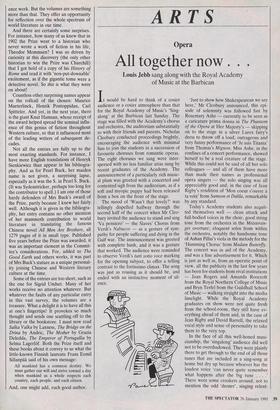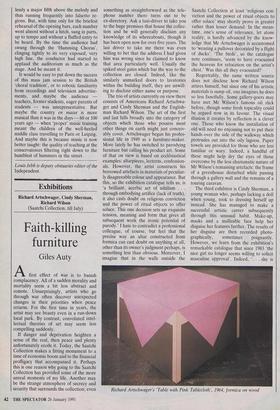ARTS
Opera
All together now . .
It would be hard to think of a cosier audience or a cosier atmosphere than that for the Royal Academy of Music's 'Sing- along' at the Barbican last Sunday. The stage was filled with the Academy's chorus and orchestra, the auditorium substantially so with their friends and parents. Nicholas Cleobury conducted proceedings brightly, encouraging the audience with minimal fuss to join the students in a succession of favourite choruses from romantic operas. The eight choruses we sang were inter- spersed with no less familiar arias sung by recent graduates of the Academy. The announcement of a particularly rich music- al plum was greeted with a concerted and contented sigh from the auditorium, as if a soft and myopic puppy had been released from a box on the front of the stage.
The mood of 'Wasn't that lovely?' was tellingly dispelled halfway through the second half of the concert when Mr Cleo- bury invited the audience to stand and sing `Va pensiero' — the Slaves' Chorus from Verdi's Nabucco — as a gesture of sym- pathy for people suffering and dying in the Gulf war. The announcement was greeted with complete hush, and it was a gesture that worked. The audience were reminded to observe Verdi's tutti sotto voce marking for the opening subject, to offer a telling contrast to the fortissimo climax. The song was just as rousing as it should be, and ended with an instinctive moment of sil- ence. `Just to show how Shakespearean we are here,' Mr Cleobury announced, this epi- sode of solemnity was followed fast by Rosemary Ashe — currently to be seen as a caricature prima donna in The Phantom of the Opera at Her Majesty's — skipping on to the stage in a silver Lurex fairy's dress to throw off a loud, outrageous and very funny performance of le suis Titania' from Thomas's Mignon. Miss Ashe, in the confines of a concert performance, showed herself to be a real creature of the stage. While this could not be said of all her solo colleagues — and all of them have more than made their names as professional opera singers — the solo singing was all appreciably good and, in the case of Jean Rigby's rendition of 'Mon coeur s'ouvre a to voix' from Samson et Dania, remarkable by any standard.
Today's Academy students also acquit- ted themselves well — clean attack and full-bodied voices in the choir, good string tone from the orchestra in the Meistersin- ger overture; eloquent solos from within the orchestra, notably the handsome tone of Ashan Pillai's viola in the melody for the `Humming Chorus' from Madam Butterfly. The concert was in aid of the Academy, and was a fine advertisement for it. Which is just as well as, from an operatic point of view, all the publicity in the last few years has been for students from rival institutions — Joan Rogers and Amanda Roocroft from the Royal Northern College of Music and Bryn Terfel from the Guildhall School of Music — walking straight into the media limelight. While the Royal Academy graduates on show were not quite fresh from the school-room, they still have ev- erything ahead of them and, in the case of Jean Rigby and David Barrel!, the relaxed vocal style and sense of personality to take them to the very top.
In the face of all this well-honed musi- cianship, the `singalong' audience did well not to be overshadowed. They were plainly there to get through to the end of all those tunes that are included in a sing-song at home but dry up because whoever has the loudest voice 'can never quite remember what happens after the big tune . . There were some croakers around, not to mention the odd 'droner', singing relent- lessly a major fifth above the melody and thus running frequently into falsetto re- gions. But, with time only for the briefest rehearsal of the opening bars, each number went almost without a hitch, sung in parts, up to tempo and without a fluffed entry to be heard. By the time the audience had swung through the 'Humming Chorus', clinging tightly to its very exposed, very high line, the conductor had started to applaud the auditorium as much as the stage. And he meant it.
It would be easy to put down the success of this mass jam session to the British 'choral tradition', or to robotic familiarity from recordings and television advertise- ments, and maybe the audience teachers, former students, eager parents of students — was unrepresentative. But maybe the country en masse is more musical than it was in the days — 60 or 100 years ago — when 'proper' music training meant the children of the well-heeled middle class travelling to Paris or Leipzig. And maybe this is because music is now better taught: the quality of teaching at the conservatoires filtering right down to the humblest of hummers in the street.
Louis Jebb is deputy obituaries editor of the Independent.



























































 Previous page
Previous page